NĂNG LỰC HIỆN TẠI, THÁCH THỨC VÀ NHU CẦU NÂNG CAO NĂNG LỰC CỦA CÁN BỘ KHUYẾN NÔNG TRONG BỐI CẢNH BIẾN ĐỔI KHÍ HẬU TẠI TỈNH BẮC KẠN
DOI:
https://doi.org/10.51453/2354-1431/2024/1030Từ khóa:
agricultural extension, capacity, challenges, climate changeTóm tắt
This study aims to assess the current capacity, challenges and needs of capacity building of agricultural extension workers in Bac Kan province under the context of climate change. The research was conducted during 2021-2022, using semi-structured questionnaires for face-to-face interviews with 17 leaders and 59 staff members of agricultural extension agencies in the province. Results show that the agricultural extension workforce of Bac Kan province has advantages in terms of qualifications and work experience. Nonetheless, they also encountered a number of challenges under the context of increasingly changing environment. These include: (1) passivity in guiding production and technical transfer activities, (2) difficulties in pest and disease forecast and management, (3) increased workload; and (4) their communication and/or community outreach activities face many challenges, especially in localities with ethnic minorities, scattered housing locations, and difficult travel access. Most of the agricultural extension workers have not been trained in both agricultural extension methods and climate change adaptation. Technical climate-resilient production manuals (for both crops and livestock), effective communication methods and information sharing networks among agricultural extension officers were considered the main learning resources that they desired to be equipped to effectively carry out their tasks under the context of climate change.
Tải xuống
Tài liệu tham khảo
Ministry of Labor - Invalids and Social Affairs (2022). Decision No. 125/QD-LDTBXH dated February 22, 2022 Announcing the results of reviewing poor and near-poor households in 2021 according to the multi-dimensional poverty standard applied for the period 2016-2020.
People's Committee of Bac Kan province (2021). Decision No. 473/QD-UBND dated April 8, 2021 promulgating the Program to support labor market development and job creation in Bac Kan province for the period 2021 - 2025.
People's Committee of Bac Kan province (2020). Action Plan to respond to climate change for the period 2021 - 2030, vision to 2050 of Bac Kan province. Bac Kan Official Gazette, No. 30, October 23, 2020.
Antwi-Ageyi, P. & Stringer, L. C. (2021). Improving the effectiveness of agricultural extension services in supporting farmers to adapt to climate change: Insights from northeastern Ghana. Climate Risk Management, vol.32 (2021) 100304, pp.1-13.
Bac Kan Portal (2020). Overview of Bac Kan province. Provincial People's Committee of Bac Kan. Website: https://backan.gov.vn/pages/gioi-thieu-chung-ve-tinh-bac-kan.aspx, accessed Aug 24, 2023.
Care International in Vietnam (2013), Climate vulnerability and capacity of ethnic minorities in the northern mountainous region of Vietnam. Website: https://careclimatechange.org/cvca-ethnic-vietnam/, [accessed May 19, 2023].
Food and Agriculture Organization (FAO) (2023), Climate Smart Agriculture Sourcebook, https://www.fao.org/climate-smart-agriculture-sourcebook/enabling-frameworks/module-c2-supporting-rural-producers/chapter-c2-2/en/, accessed Aug 24, 2023
IPCC (2022), Technical Summary. In: Climate Change 2022: Impacts, Adaptation and Vulnerability. Contribution of Working Group II to the Sixth Assessment Report of the Intergovernmental Panel on Climate Change. Cambridge University Press, Cambridge, UK and New York, NY, USA, pp. 37–118.
Meera, S.N., Balaji, V., Muthuraman, P., Sailaja, B., Dixit, S. (2012). Changing Roles of Agricultural Extension: Harnessing Information and Communication Technology (ICT) for Adapting to Stresses Envisaged Under Climate Change. In: Crop Stress and its Management: Perspectives and Strategies. Springer: Dordrecht.
Tải xuống
Đã Xuất bản
Cách trích dẫn
Số
Chuyên mục
Giấy phép

Tác phẩm này được cấp phép theo Giấy phép Quốc tế Creative Commons Attribution-ShareAlike 4.0 .
Bài báo được xuất bản ở Tạp chí Khoa học Đại học Tân Trào được cấp phép theo giấy phép Ghi công - Chia sẻ tương tự 4.0 Quốc tế (CC BY-SA). Theo đó, các tác giả khác có thể sao chép, chuyển đổi hay phân phối lại các bài báo này với mục đích hợp pháp trên mọi phương tiện, với điều kiện họ trích dẫn tác giả, Tạp chí Khoa học Đại học Tân Trào và đường link đến bản quyền; nêu rõ các thay đổi đã thực hiện và các nghiên cứu đăng lại được tiến hành theo cùng một bản quyền.
Bản quyền bài báo thuộc về các tác giả, không hạn chế số lượng. Tạp chí Khoa học Tân Trào được cấp giấy phép không độc quyền để xuất bản bài báo với tư cách nhà xuất bản nguồn, kèm theo quyền thương mại để in các bài báo cung cấp cho các thư viện và cá nhân.
Mặc dù các điều khoản của giấy phép CC BY-SA không dành cho các tác giả (với tư cách là người giữ bản quyền của bài báo, họ không bị hạn chế về quyền hạn), khi gửi bài tới Tạp chí Khoa học Đại học Tân Trào, tác giả cần đáp ứng quyền của độc giả, và cần cấp quyền cho bên thứ 3 sử dụng bài báo của họ trong phạm vi của giấy phép.






